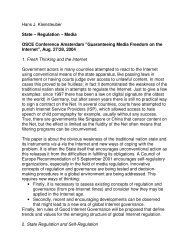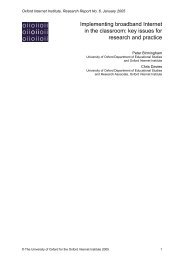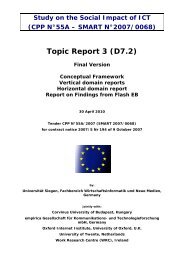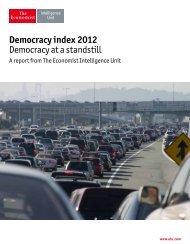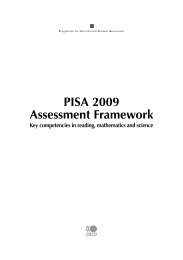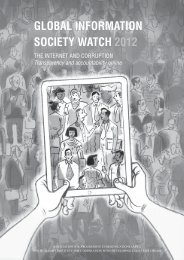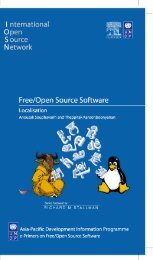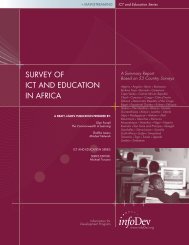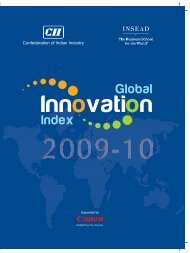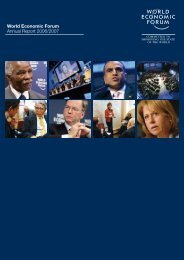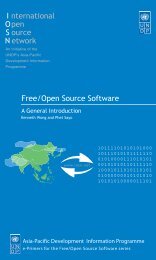Internet Freedom A Foreign Policy Imperative in the Digital Age
Internet Freedom A Foreign Policy Imperative in the Digital Age
Internet Freedom A Foreign Policy Imperative in the Digital Age
Create successful ePaper yourself
Turn your PDF publications into a flip-book with our unique Google optimized e-Paper software.
Voron<strong>in</strong> called for a recount, and<strong>the</strong> electoral commission foundno evidence of fraud. The Party ofCommunists proceeded to take <strong>the</strong>majority of seats <strong>in</strong> Parliament but,weakened by <strong>the</strong> protests, failed toelect a prime m<strong>in</strong>ister. 77 The presidentdissolved Parliament threemonths later.In June 2009, supporters of <strong>the</strong>opposition candidate, Mir-Hosse<strong>in</strong>Mousavi, staged massive protestschalleng<strong>in</strong>g <strong>the</strong> results of <strong>the</strong>Iranian presidential election thatnamed <strong>the</strong> <strong>in</strong>cumbent PresidentMahmoud Ahmad<strong>in</strong>ejad <strong>the</strong> w<strong>in</strong>ner.The protests known as <strong>the</strong> GreenRevolution were also nicknamed <strong>the</strong>“Twitter Revolution” for <strong>the</strong> role thatTwitter and o<strong>the</strong>r <strong>Internet</strong>-basedsocial network<strong>in</strong>g sites reportedlyplayed <strong>in</strong> facilitat<strong>in</strong>g communicationwith<strong>in</strong> Iran and with <strong>the</strong> rest of<strong>the</strong> world. The demonstrations wereput down with brutal force and <strong>the</strong>revolution failed.In April 2010, a series of riots anddemonstrations took place <strong>in</strong>Kyrgyzstan stemm<strong>in</strong>g from dissatisfactionand anger aga<strong>in</strong>stPresident Kurmanbek Bakiyev’sadm<strong>in</strong>istration. Observers haveoffered differ<strong>in</strong>g perspectives on<strong>the</strong> role social media played dur<strong>in</strong>g<strong>the</strong> Kyrgyz protests (with some, for<strong>in</strong>stance, argu<strong>in</strong>g that platformssuch as Twitter were more effective<strong>in</strong> broadcast<strong>in</strong>g <strong>the</strong> demonstrationsthan <strong>in</strong> organiz<strong>in</strong>g <strong>the</strong>m). 78 <strong>Age</strong>neral consensus exists, however,that Twitter and o<strong>the</strong>r social mediaplatforms helped br<strong>in</strong>g attentionto <strong>the</strong> revolt and contributed tomount<strong>in</strong>g pressure for Bakiyev tostep down.In December 2010, Tunisianstook to <strong>the</strong> streets protest<strong>in</strong>ghigh unemployment, high foodprices, corruption and <strong>the</strong> lack offreedom of speech, and called forPresident Z<strong>in</strong>e el-Abid<strong>in</strong>e Ben Alito step down. These protests weredubbed <strong>the</strong> “Jasm<strong>in</strong>e Revolution,”but were also called <strong>the</strong> “FacebookRevolution.” 79 The protests werespearheaded by a number of youngbloggers that employed Facebook,Twitter, blogg<strong>in</strong>g sites and emailto organize protests nation-wide. 80On January 14, 2011, after 28 daysof protests, Ben Ali dissolved <strong>the</strong>Parliament and <strong>the</strong>n resigned, end<strong>in</strong>ghis 23-year rule.In January 2011, Egyptians took part<strong>in</strong> peaceful mass demonstrationsand strikes call<strong>in</strong>g for PresidentHosni Mubarak to step down,actions that escalated <strong>in</strong>to violentclashes with <strong>the</strong> police. The protestswere organized through <strong>the</strong> “WeAre All Khaled Said” Facebook page,named after a young blogger whowas beaten to death by police <strong>in</strong>June 2010, and whose death fueled<strong>the</strong> outrage surround<strong>in</strong>g <strong>the</strong> <strong>in</strong>itialrevolts. 81 Over 2 million people protested<strong>in</strong> Cairo’s Tahrir Square andprotests were held <strong>in</strong> several o<strong>the</strong>rmajor Egyptian cities. 82 Observ<strong>in</strong>g<strong>the</strong> protestors’ use of social media,<strong>the</strong> Mubarak regime shut downnearly all <strong>Internet</strong> and cellphoneservice with<strong>in</strong> <strong>the</strong> country for fivedays. 83 The shutdown backfired –<strong>the</strong> protests grew enormously and<strong>the</strong> move prompted both <strong>in</strong>ternationalcondemnation and domesticoutrage. 84 On February 11, Mubarakstepped down after 30 years ofpower and handed control to militaryleaders.As of this writ<strong>in</strong>g, mass protestscont<strong>in</strong>ue <strong>in</strong> countries across<strong>the</strong> Middle East. The role of <strong>the</strong><strong>Internet</strong> <strong>in</strong> <strong>in</strong>fluenc<strong>in</strong>g and facilitat<strong>in</strong>g<strong>the</strong>se demonstrations varies bycountry, and <strong>the</strong> extent to which<strong>the</strong> protests will ultimately causepolitical change rema<strong>in</strong>s unclear.However, <strong>the</strong>se examples showthat <strong>the</strong> <strong>Internet</strong> gives activists<strong>in</strong> closed societies tools throughwhich to express dissent and unite<strong>in</strong>dividuals at an unprecedentedpace and scale, and will undoubtedlyserve as a tool for politicalaction – among both protestorsand <strong>the</strong> regimes <strong>the</strong>y oppose – for<strong>the</strong> foreseeable future.| 23



